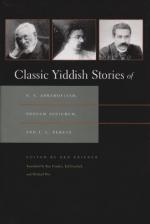|
This section contains 6,664 words (approx. 23 pages at 300 words per page) |

|
SOURCE: "Voices of Ambivalence in Sholem Aleichem's Monologues," in Prooftexts, Vol. 1, No. 2, May, 1981, pp. 158-71.
In the following essay, Wirth-Nesher discusses the paradoxical nature of the monologue form in Aleichem's short fiction.
It is generally recognized that Sholem Aleichem's success as a writer rests upon an almost mystical intermingling of laughter and trembling, the combination of traits that Bellow singled out as characteristic of Jewish literature in general.1 Since the appearance of his fiction in the 1880s, generations of readers have been asking themselves just how Sholem Aleichem manages to both move and amuse them simultaneously. A quick review of his most memorable characters—Moti the cantor's son, Tevye the dairyman, Menakhem-Mendl the luftmentsh—demonstrates that the human voice is the medium of his great achievement, for in spoken language he found his vehicle for expressing Jewish life in Eastern Europe at the turn of the century.2 The...
|
This section contains 6,664 words (approx. 23 pages at 300 words per page) |

|


